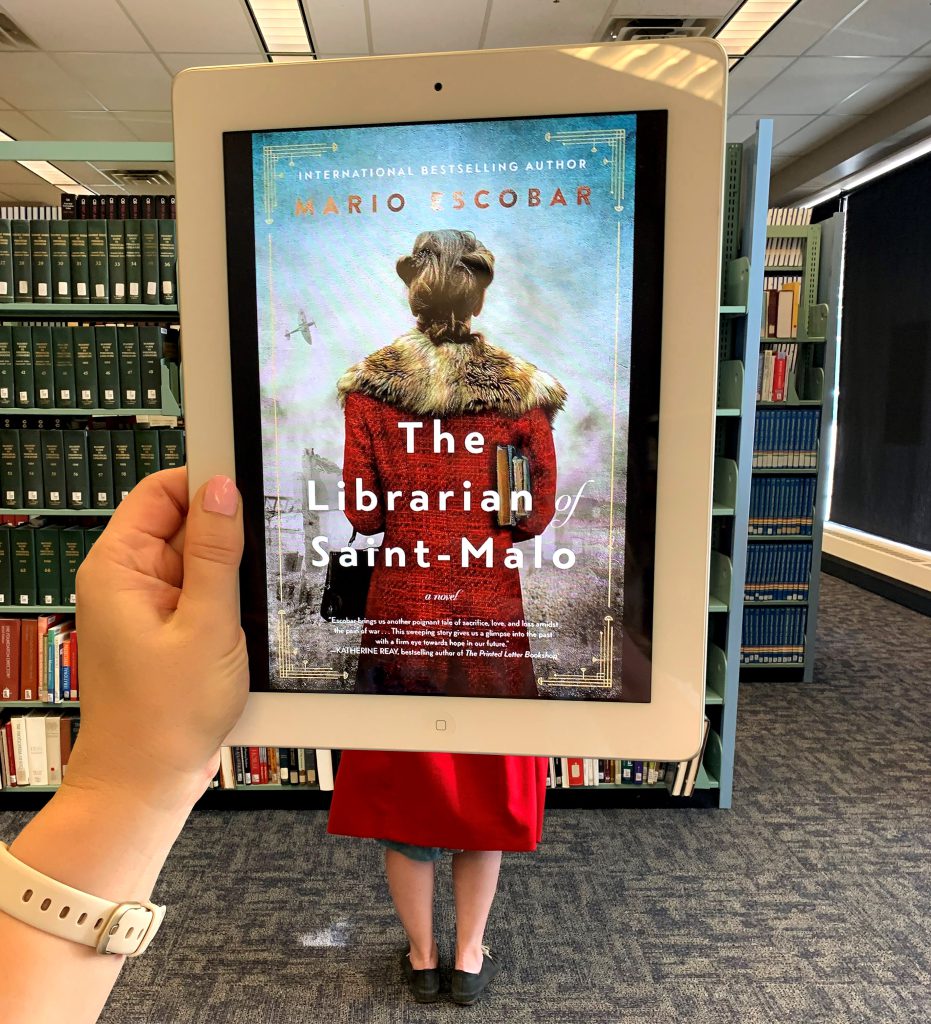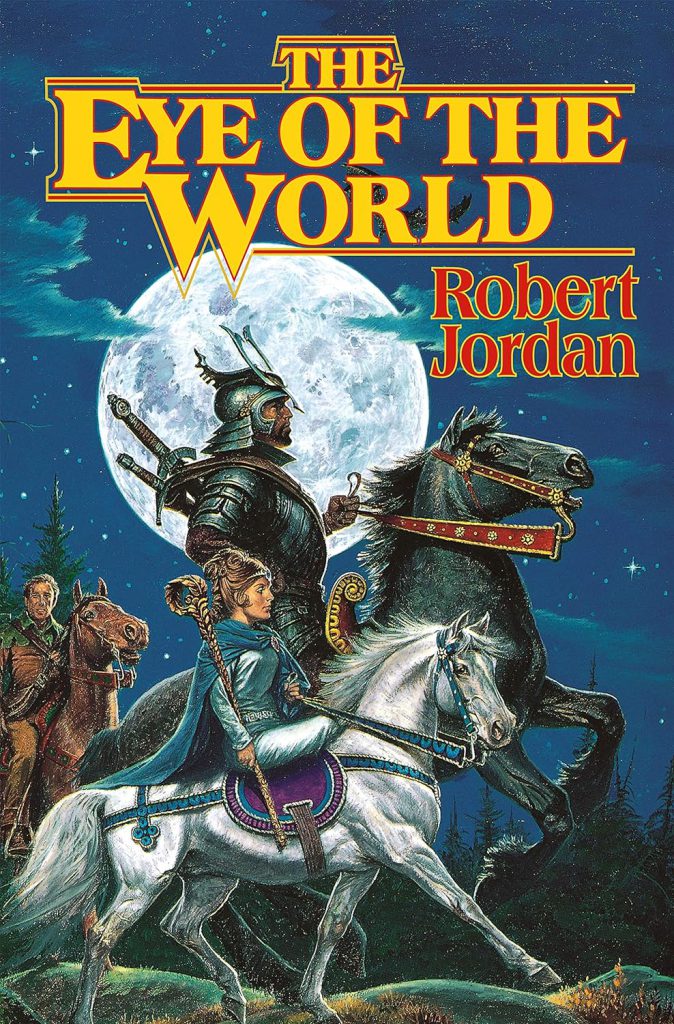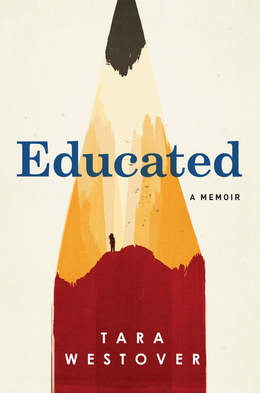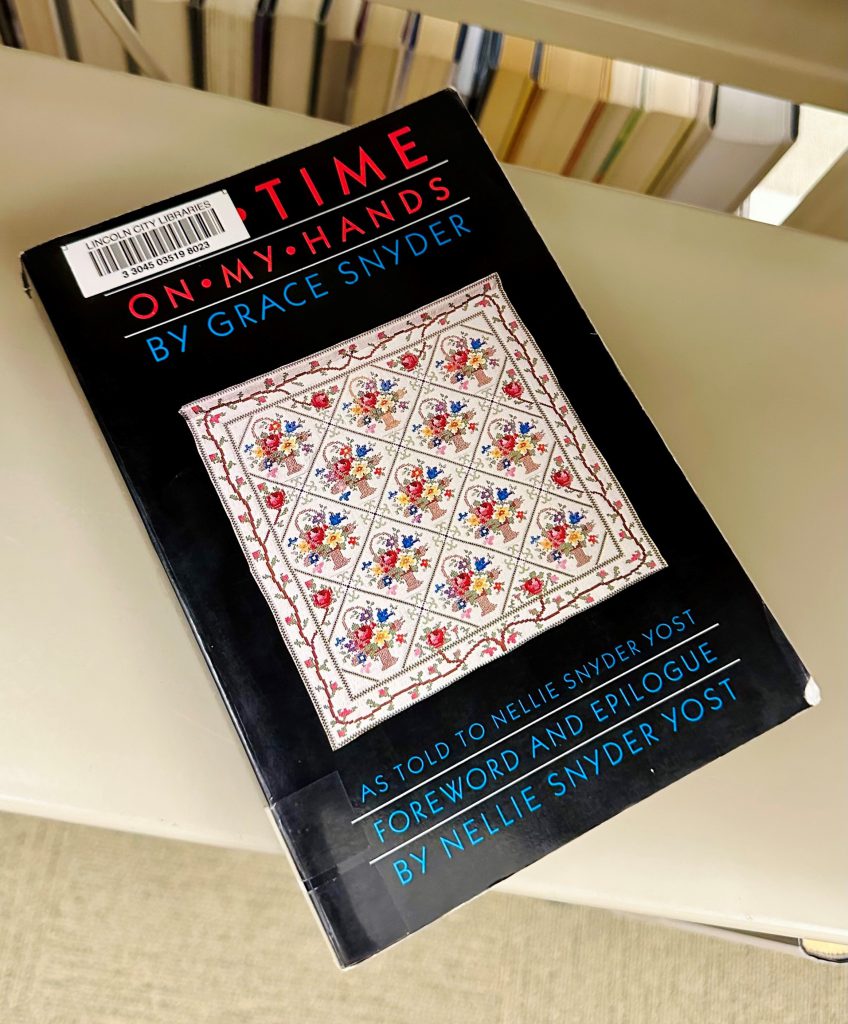Search the Blog
Categories
- Books & Reading
- Broadband Buzz
- Census
- Education & Training
- Friday Reads
- General
- Grants
- Information Resources
- Library Management
- Nebraska Center for the Book
- Nebraska Libraries on the Web
- Nebraska Memories
- Now hiring @ your library
- Preservation
- Pretty Sweet Tech
- Programming
- Public Library Boards of Trustees
- Public Relations
- Talking Book & Braille Service (TBBS)
- Technology
- Uncategorized
- What's Up Doc / Govdocs
- Youth Services
Archives
Subscribe
Category Archives: Books & Reading
Friday Reads: Ponyboy, Poetry, Kees, and You
I have started reading too many books to write about just one, so for this post, this time, I’m writing about four books. A debut novel with Nebraska connections getting national critical attention, a poet often overlooked in favor of more famous compatriots, another Nebraskan of cinematic mystique, and a brand new non-fiction book about tech that will make you want to put down your phone camera. Let’s go!
Longlisted for a National Book Award, and written by an author born in Nebraska, Eliot Duncan’s Ponyboy is a globetrotting story with a trans, addicted protagonist—but the story is about relationships: between parent and child, within friend groups, and also the relationships we have with ourselves–and with our pasts and our futures. This is the first novel from the Iowa Writers’ Workshop alumnus. More about the book, the author, and recent press can be found at the author’s website .
I recently read about Gabriela Mistral, the first Latin American writer to win the Nobel Prize for Literature in 1945, and I want to read more of her work. I checked out this enormous book, The FSG Book of Twentieth-Century Latin American Poetry, because it shows each work in its original language as well as its translation into English. Being able to read Mistral’s poems in Spanish and English helps me appreciate her intentions and the beauty of her work. Mistral wrote about unexpected things in unpopular ways. You can read some of her work here.
Weldon Kees is a fascinating character, born in Beatrice in 1914. He had a colorful and exciting life in Nebraska and neighboring states, eventually moving to California, where he disappeared in 1955. He produced art in many forms, and also worked as a librarian, among other interesting jobs. After seeing a recent story about new acquisitions related to Weldon Kees at University of Nebraska Libraries, I picked up a used copy of The Ceremony & Other Stories. I am still waiting for the movie of his life. Check this link for a photo from Kees’ diary in 1954 to see a list of books and movies he enjoyed that year.
Your Face Belongs to Us is an important story about what happens when technology moves faster than ethics or the law. Kashmir Hill writes about the tech company that best optimized facial recognition software, and the various motives of the people involved with the project. If you think they don’t have your best interests at heart, you are correct. No matter your opinion of facial recognition software, if you’re interested in the technology and its effects, this is some old-fashioned shoe-leather reporting that will surprise and disturb you.
Duncan, Eliot. 2023. Ponyboy : A Novel First ed. New York NY: W. W. Norton & Company.
Hill, Kashmir. 2023. Your Face Belongs to Us : A Secretive Startup’s Quest to End Privacy As We Know It First ed. New York: Random House an imprint of Penguin Random House LLC.
Kees, Weldon and Dana Gioia (ed.). 1984. The Ceremony & Other Stories. Port Townsend Wash: Graywolf Press.
Stavans, Ilan. 2011. The FSG Book of Twentieth-Century Latin American Poetry : An Anthology. 1st ed. New York: Farrar Straus Giroux.
Book Club Spotlight – The Lightning Dreamer: Cuba’s Greatest Abolitionist
Hispanic Heritage Month is from September 15th to October 15th, and to celebrate, we are Spotlighting The Lightning Dreamer, written by Margarita Engle, the first Latino awarded the Newbery Honor and the Poetry Foundation’s sixth Young People’s Poet Laureate.
A Golden Sower nominee, The Lightning Dreamer also has the unique distinction of being awarded the Pura Belpré honor, an award presented to a Latino/Latina writer who “best portrays, affirms, and celebrates the Latino cultural experience in an outstanding work of literature for children and youth.” Inspired by Engle’s Cuban heritage, this title is a historical fiction novel written in verse, following one of the country’s most prominent female writers, feminists, and abolitionists- Gertrudis Gómez de Avellaneda, known here, as Tula.Slavery was a way of life in nineteenth-century Cuba, and for young Tula, she believes that her future in an arranged marriage would be a similar kind of endless servitude. Cuban women were expected to be quiet and listen to the men rather than think for themselves—something Tula did a lot. And when she begins to read the banned works of abolitionist poet José María Heredia, her ideas grow restless and revolutionary. Breaking from expectations, Tula starts to write plays for the local orphanage, and her open views on abolition inspire her family’s cook to flee from the looming threat of enslavement. But her bold actions are belittled and mocked by her mother and others, and Tula is sent away from home after refusing an arranged marriage. At her grandfather’s estate, she falls in love with a former slave named Sab, who is desperately in love with another girl who will not have him because of his dark skin. His story moves Tula deeply, and as we follow her throughout the years, she becomes more confident and outspoken with her abolitionist and feminist poetry, even though the very act could put her in jail- or worse.
“I’m tired of being told
margarita engle
that my feelings are too wild.”
Written for readers in middle grades and up, The Lightning Dreamer serves as an introduction to Avellaneda (Tula) and other great abolitionist Latino poets such as José María Heredia and Jose Marti (a particular inspiration to Engle) and includes short bios and excerpts from Avellaneda and Heredia to tie the reader into the real-life story. While Engle’s depiction of Avellaneda meeting Sab is wholly fictional, the story is not. Avellaneda’s first and most controversial novel, Sab, about an enslaved Cuban boy in love with his master’s daughter, explores the humanity and ethics of Sab against the amoral white characters, a stance unheard of at the time. The novel was banned from her home country of Cuba because of the interracial love story, its critique of marriage, and its criticism of societal norms. While published a decade before Uncle Tom’s Cabin, the two share similar backgrounds and critical receptions when read today. Like many of Engle’s novels, The Lightning Dreamer centers around young people who choose hope in hopeless situations, which many may experience today. And Avellaneda put herself at considerable risk to publish Sab and bring hope to her home.
If you’re interested in requesting The Lightning Dreamer for your book club, you can find the Request Form here. There are 8 copies available. (A librarian must request items)
Engle, Margarita. The Lightning Dreamer. Houghton Mifflin Harcourt Publishing Company. 2013
Posted in Books & Reading
Tagged book club spotlight, books, Hispanic heritage month, Reading
Leave a comment
Nebraska Public Media Book Club Kit Inspired by the new Ken Burns documentary The American Buffalo
In partnership with Nebraska Public Media, the Nebraska Library Commission has added 30 copies of Great Plains Bison to our book club collection. Book club kits with 10 copies are also owned by: Bellevue Public Library, Kearney Public Library, Lincoln City Libraries, and the Regional Library Systems
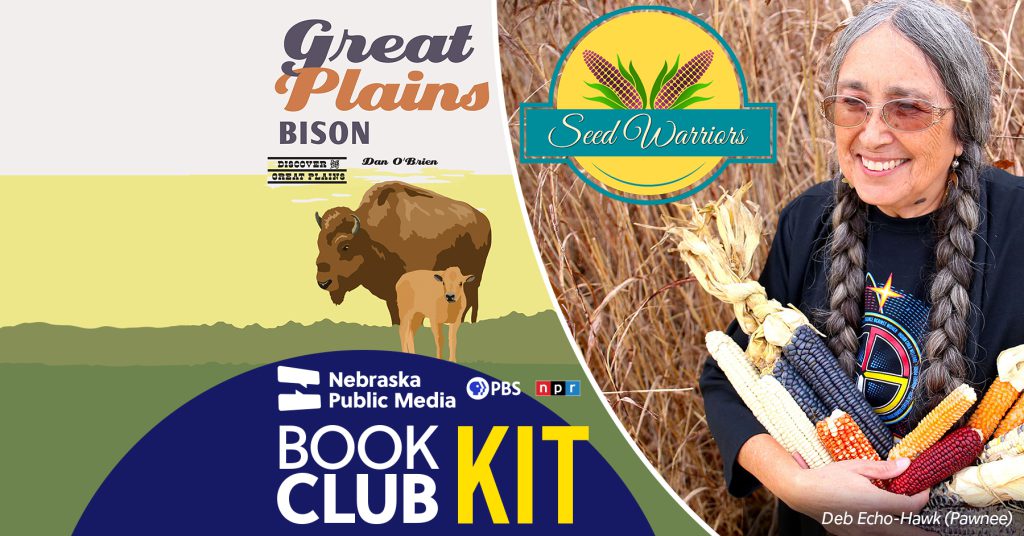
This book club kit explores the themes of conservation, restoration and respect. What can we learn from the stories of bison and the Pawnee seed keepers? How can conservation be practiced today?
The book club guide includes:
Discussion questions
Additional reading suggestions and organizations to explore
Two recipes from Chef Anthony Warrior
Great Plains Bison, written by buffalo rancher Dan O’Brien (also featured in The American Buffalo), traces the history and ecology of this American symbol from the origins of the great herds that once dominated the prairie to its near extinction in the late 19th century and the subsequent efforts to restore the bison population. A project of the Center for Great Plains Studies and the School of Natural Resources, University of Nebraska; published by Bison Books.
Seed Warriors, directed by Rebekka Schlichting (Ioway Tribe of Kansas and Nebraska), follows a group of seed keepers in their ancestral homelands of Nebraska as they seek to regain sovereignty over the food system. By reclaiming their sacred corn seeds, they work to return to the healthy, traditional lifeways of the Pawnee people. Learn more at PawneeSeed.org.
Produced in collaboration with Nebraska Public Media for the HOMEGROWN: Future Visions digital shorts series. HOMEGROWN: Future Visions is a Co-Production of Firelight Media and the Center for Asian American Media (CAAM), with funding provided by the CORPORATION FOR PUBLIC BROADCASTING (CPB), In Association with PBS
Ken Burns’s newest documentary, The American Buffalo, tells the dramatic story of the near extinction and improbable rescue of America’s national mammal. Premiering October 16 on PBS and the PBS Video App. Learn more at PBS.org/americanbuffalo.
Posted in Books & Reading, Education & Training
Leave a comment
#BookFaceFriday “The Bromance Book Club” by Lyssa Kay Adams
The first rule of #BookFace: You don’t talk about #BookFace!
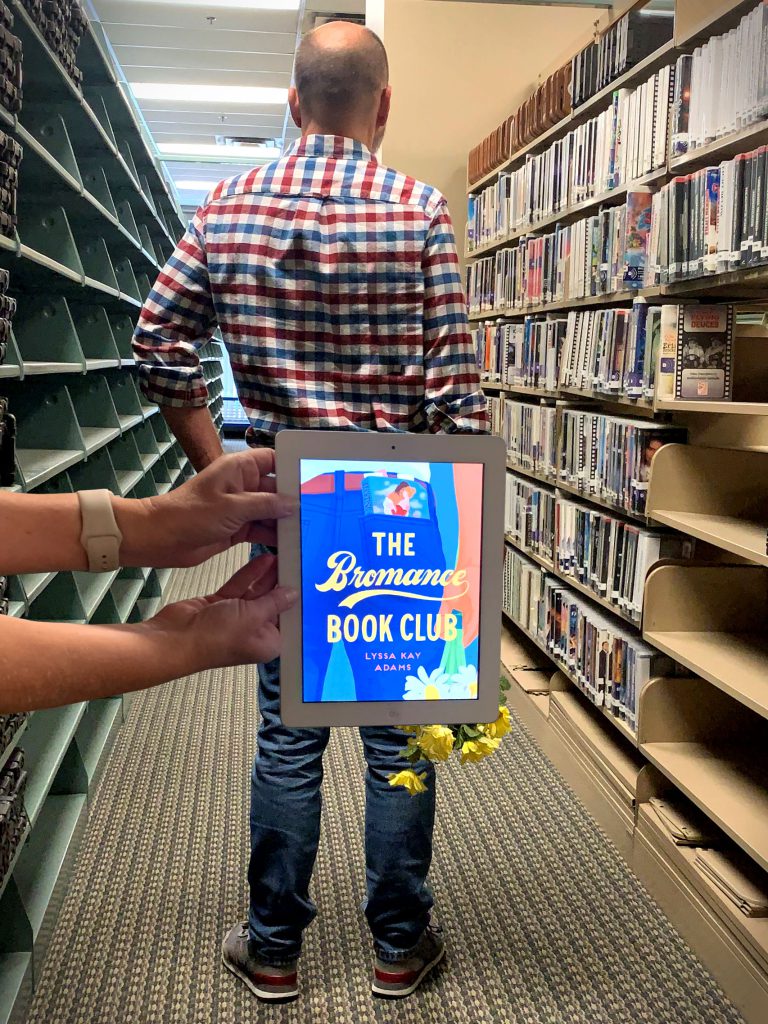
Just kidding – it’s no secret that September is Library Card Sign Up Month! Everyone is welcome at the library, especially book clubs! This week’s title is all about the power of a good book club, “The Bromance Book Club” by Lyssa Kay Adams (Berkley, 2019) is available as both an eBook and Audiobook. Find all the library-themed books in our “Library Card Sign Up Month” collection. There are 200 titles in the collection all about those bookish reads, and even better you can check them out with your library card!
Adams weaves in humor, complex emotions, and excerpts from the motivational story itself to create a satisfying courtship. A strong supporting cast, including Gavin’s book clubmates and his tiny, adorable twin daughters, helps flesh out the Legends community.”
―Publishers Weekly
Find this title and many more through Nebraska OverDrive! Libraries participating in the Nebraska OverDrive Libraries Group currently have access to a shared and growing collection of digital downloadable audiobooks and eBooks. 193 libraries across the state share the Nebraska OverDrive collection of 21,696 audiobooks, 35,200 eBooks, and 3,964 magazines. As an added bonus it includes 130 podcasts that are always available with simultaneous use (SU), as well as SU ebooks and audiobook titles that publishers have made available for a limited time. If you’re a part of it, let your users know about this great title, and if you’re not a member yet, find more information about participating in Nebraska Overdrive Libraries!
Love this #BookFace & reading? Check out our past #BookFaceFriday photos on the Nebraska Library Commission’s Facebook page!
Friday Reads: So Many Steves: Afternoons with Steve Martin by Steve Martin and Adam Gopnik
This is another Friday listens as this title is only available in audio format. Published by Pushkin Audio (co-founded by Jacob Weisberg and Malcolm Gladwell) — “Pushkin audiobooks are not your typical author-in-front-of-a-microphone productions. They are immersive — you hear the actual voices of the people being interviewed, archival footage, and beautiful scoring.” I’ve been a Steve Martin fan since his white-suit and arrow-through-the-head days. His SNL skits from Dancing in the Dark with with Gilda Radner to the Festruck Brothers with Dan Ackroyd were legend. Years ago, he loaned a piece of art from his collection for an exhibit in the Sheldon Museum of Art and I often sat and watched it after my campus walks. The proximity was oddly thrilling.
This audio-biography is a series of conversations recorded over the course of a year between Steve and long-time friend Adam Gopnik. The two met in the fall of 1990 at a controversial exhibit Gopnik curated called High and Low: Modern Art and Popular Culture at the Museum of Modern Art. They shared many conversations since that time and decided to record Adam, asking questions about Steve’s evolution in both his personal and professional life. The topics cover Steve as magician, standup comic, actor, writer, playwright, musician, composer, and art collector. Hence the title, So Many Steves, that was inspired by a poem written by e.e. cummings, So Many Selves.
I saved this book to listen to on the morning of my birthday while I walked. I learned that Steve used Carl Reiner as a personality mentor watching and studying Carl’s ease with people in conversation employing deft humor. When Tommy Smothers said that “talking to Steve Martin is like sitting in a room alone” – you understand, Steve knew he needed help overcoming his off stage social ineptitude. The best takeaway was Steve reflecting on his life in the late 80s at a time when he began trusting his craft and wondering what was different. There was a Hungarian word for this, Pihentagyú, which means “a relaxed brain.” It describes a quick-witted person who can come up with sophisticated jokes or solutions because their mind is at rest. With a relaxed brain, it is easier to think quickly and clearly. I would credit this to both age and experience, so listening to this while marking another year was especially meaningful.
Of course, I understand the value of print, and I am a long time audio book listener, but these hybrid audio presentations are exactly what I want from an author and performer. A conversational narrative accompanied with a specific soundtrack relevant to the story. If this sounds like your kind of thing, check out Miracle and Wonder: Conversations with Paul Simon, a finalist for the 2023 audiobook of the year. Audible’s Words+Music recordings with over 35 notable musicians are also something to consider. There’s no shortage of ways to delight your aural senses.
Steve Martin and Adam Gopnik So Many Steves: Afternoons with Steve Martin. Pushkin Industries. 2023.
What’s Up Doc? New State Agency Publications at the Nebraska Library Commission
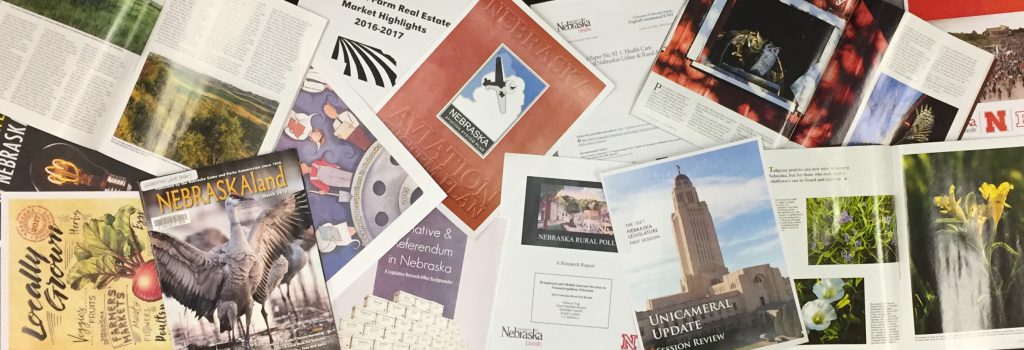
New state agency publications have been received at the Nebraska Library Commission for July and August, 2023. Included are reports from the Nebraska Administrative Services, Nebraska Colleges & Universities, the Nebraska Board of Examiners, the Nebraska Department of Labor, and new books from the University of Nebraska Press, to name a few.
Most items, except the books from the University of Nebraska Press, are available for immediate viewing and printing by clicking on the highlighted link above, or directly in the .pdf below. You can read synopses of the books received from the University of Nebraska Press in the Book Briefs blogposts.
The Nebraska Legislature created the Nebraska Publications Clearinghouse in 1972 as a service of the Nebraska Library Commission. Its purpose is to collect, preserve, and provide access to all public information published by Nebraska state agencies. By law (State Statutes 51-411 to 51-413) all Nebraska state agencies are required to submit their published documents to the Clearinghouse. For more information, visit the Nebraska Publications Clearinghouse page, contact Mary Sauers, Government Information Services Librarian; or contact Bonnie Henzel, State Documents Staff Assistant.
Posted in Books & Reading, Education & Training, General, Information Resources, What's Up Doc / Govdocs
Tagged books, GovDocs, Reading
Leave a comment
Friday Reads: “The Wheel of Time Series” by Robert Jordan
I’ve been reading this series since I was a freshman in high school, and by then the first books were almost 15 years old, so you know they pass the test of time. I’ve been reading and rereading this series off and on ever since. It’s one of my favorite fantasy series, full of flawed characters, adventure, love stories, and tragedies. The first book in the series is The Eye of the World, It follows a group of young adults, childhood friends, as they’re pulled out of the comfortable small village they’ve always known and thrown into a fight between good and evil and the possible destruction of the world as they know it. It’s a long series, 14 books, and Lincoln City Libraries and Nebraska Overdrive Libraries both have all of them in eBook and Audiobook format available on Libby. If you were a fan of Game of Thrones with its multiple character story lines and young heroes and heroines, this is a great series for you. Prime Video came out with a TV series last year, and while I enjoyed it, I will always urge someone to read the books. They are infinitely better.
Jordan, Robert. The Eye of the World. Tor Books. 1990.
Posted in Books & Reading, General
Tagged A Hawthorne and Horowitz Mystery, Anthony Horowitz, Book Review, Friday Reads, mystery, Reading, series, The Word is Murder
1 Comment
#BookFaceFriday “The Bookish Life of Nina Hill” by Abbi Waxman
Read between the lines with this #BookFaceFriday!
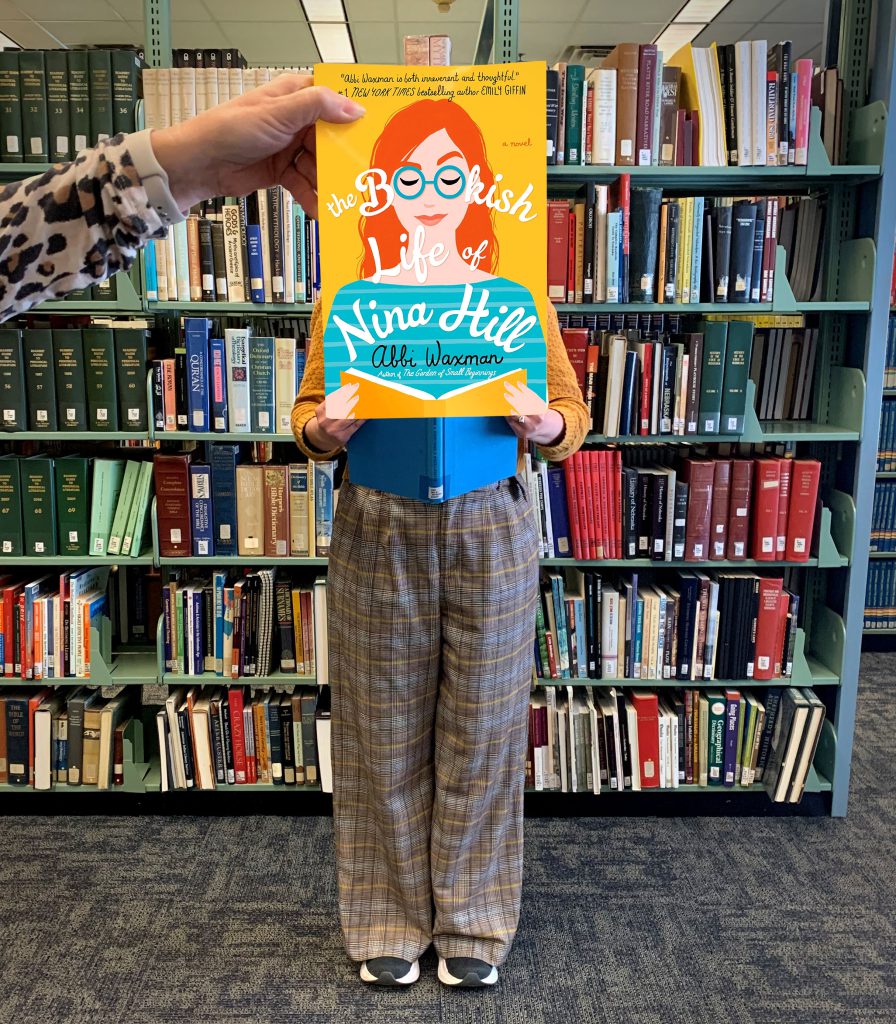
It’s another bookish #bookface for Library Card Sign Up month! A library card gives you access to so many great things, including free ebooks and audiobooks if your local library participates in Nebraska Overdrive Libraries! One such eBook is “The Bookish Life of Nina Hill : A Novel” by Abbi Waxman (Berkley, 2019) – an irreverent novel about a millennial bookworm who lives her life vicariously through books . Find all the library-themed books in our “Library Card Sign Up Month” collection. There are 200 titles in the collection all about those bookish reads, and even better you can check them out with your library card!
“In this love letter to book nerds, Waxman introduces the extraordinary introvert Nina Hill…. With witty dialogue and a running sarcastic inner monologue, Waxman brings Nina to vibrant life as she upends her introverted routine and becomes part of the family. Fans of Jojo Moyes will love this.”
―Publishers Weekly
Find this title and many more through Nebraska OverDrive! Libraries participating in the Nebraska OverDrive Libraries Group currently have access to a shared and growing collection of digital downloadable audiobooks and eBooks. 189 libraries across the state share the Nebraska OverDrive collection of 21,696 audiobooks, 35,200 eBooks, and 3,964 magazines. As an added bonus it includes 130 podcasts that are always available with simultaneous use (SU), as well as SU ebooks and audiobook titles that publishers have made available for a limited time. If you’re a part of it, let your users know about this great title, and if you’re not a member yet, find more information about participating in Nebraska Overdrive Libraries!
Love this #BookFace & reading? Check out our past #BookFaceFriday photos on the Nebraska Library Commission’s Facebook page!
Call for Speakers: Big Talk From Small Libraries 2024

The Call for Speakers for Big Talk From Small Libraries 2024 is now open!
Submit your proposal by Friday, December 15, 2023.
This free one-day online conference is tailored for staff from small libraries; the smaller the better!
Small libraries of all types – public, academic, school, museum, special, etc. – are encouraged to submit a proposal. We’re looking for seven 50-minute presentations and four 10-minute “lightning round” presentations.
Do you offer a service or program at your small library that other librarians might like to hear about? Have you implemented a new (or old) technology, hosted an event, partnered with others in your community, or just done something really cool? The Big Talk From Small Libraries online conference gives you the opportunity to share what you’ve done, while learning what your colleagues in other small libraries are doing.
Here are some possible topics to get you thinking:
- Unique Libraries
- Special Collections
- New buildings
- Fundraising
- Improved Workflows
- Staff Development
- Advocacy Efforts
- Community Partnerships
- That great thing you’re doing at your library!
Speakers from libraries serving fewer than 10,000 people will be preferred, but presentations from libraries with larger service populations will be considered. Speakers must be from small libraries or directly partnered with a small library and submitting a proposal to co-present with the library.
Big Talk From Small Libraries 2024 will be held on Friday, February 23, 2024 between 8:45 a.m. and 5:00 p.m. (CT) via the GoTo Webinar online meeting service. Speakers will present their programs from their own desktops. The schedule will accommodate speakers’ time-zones.
This conference is sponsored by the Association for Rural & Small Libraries (ARSL) and the Nebraska Library Commission.
Photo by Patrick Fore on Unsplash
Book Club Spotlight – The Ordinary Spaceman: From Boyhood Dreams to Astronaut

Four years after what would be his final voyage into space, retired astronaut Clayton Anderson of Ashland, Nebraska, released his tell-all memoir of his 30 years at NASA, comprising 167 days living in space, working on the International Space Station and performing nearly 40 hours of spacewalks. Now, when I say this is a “tell-all” memoir, I don’t mean it in a way to dramatize or bring to mind a TMZ article. I mean it literally. Because today, our Book Club Spotlight The Ordinary Spaceman, is genuinely one of the most unflinchingly honest, funny, and candid stories about what it takes to be a NASA astronaut. Anderson’s insistence on being “an ordinary guy” might feel strange when reading a book by someone who has been to space, but it’s also his wholehearted truth.
Clayton and his mother have different ideas about when he decided to be an astronaut. He argues it started with watching the Apollo 8 mission at the age of nine, and his mom, however insists the dream was always apart of him. A proud and true Nebraskan, Clayton made his way to Texas, working at NASA as an engineer, and eventually leading the development effort for the ISS’s Caution and Warning System, all the while continuing to pursue his dream of spaceflight. Clayton applied to the astronaut program 15 times before finally being selected, and that was only the beginning. From recalling his first time breaking the sound barrier, freezing during survival training in the Russian wilderness, needing stiches while working in an undersea lab, and tragically witnessing the Columbia disaster alongside the crew’s families, Anderson is incredibly open and humble about his experiences during his time in and out of space, even when he finds himself in the wrong. Through stories of incredible isolation and excitement, frustration, and an ever-evolving sense of respect for others,, Anderson doesn’t hide his emotions in his writing, and takes us through his personal growth as a man, an astronaut, and in his faith. All while mixed in with a healthy dose of humor and sincerity that brings the reader close and holds tight until the very end.
“Performing a spacewalk outside the space station is not much different from going outside in a Nebraska winter. The space environment is just as brutal as those I encountered as a kid … okay, maybe a little bit worse.”
Clayton Anderson
Though a new addition to our Book Club Collection, The Ordinary Spaceman was awarded the Nebraska Book Award in 2016 for Creative Non-fiction, and after having lived in Texas 30 years, his home state is still very much a part of his identity, and it is clear how proud he to represent Nebraska as its first astronaut. From shaping his personality to his love of all things huskers, any Nebraska reader will feel at home reading his words and shaking their head at his (sometimes) crass humor, wondering if they have what it takes to go to space.
To this day, Anderson is a passionate STEM advocate and NASA Ambassador, and recently in 2022 he became the President and CEO of The SAC Museum in his own hometown. For him, being an astronaut is just as much about being a role model as it is about flying in the stars. Because of him, for the majority of my life, there has always been a Nebraskan Astronaut. Looking back on it now, I wonder how many opportunities were provided to me and my peers because of Anderson’s perseverance as a role model and science educator, especially to the kids of Nebraska. I even had the opportunity to meet Anderson when he was a guest speaker at the LPS-Pfizer Science Fair in 2008. Fresh off his 5-month tour on the ISS, Anderson was a pretty big name, even for us ambivalent 5th graders. I still remember seeing his big grin as he looked over the crowd of us youngsters in our science fair t-shirts and thinking about how strange it was that astronauts were just ordinary people like us. And now I know he felt the same!
The Ordinary Spaceman is one of four books by Anderson. He has written two children’s books: Letters from Space and A is for Astronaut, and a YA book: It’s A Question of Space.
“This journey is not just about technical achievements; it is about people. It is about our planet; it is about the future of the entire human race. What began from an era of competition, fueled by the launch of Sputnik forty years ago, has now become the ultimate challenge of cooperation and teamwork. This is what we owe our children and all future generations. I want to help “line the way”!”
– Anderson 1998
If you’re interested in requesting The Ordinary Spaceman for your book club, you can find the Request Form here. There are 10 copies available. (A librarian must request items)
Anderson, Clayton. The Ordinary Spaceman: From Boyhood Dreams to Astronaut. University of Nebraska Press. 2015
Book Briefs: New University of Nebraska Press Books at the Nebraska Publications Clearinghouse
The Nebraska Publications Clearinghouse receives documents every month from all Nebraska state agencies, including the University of Nebraska Press (UNP). Each month we will be showcasing the UNP books that the Clearinghouse has received.
UNP books, as well as all Nebraska state documents, are available for checkout by libraries and librarians for their patrons.
Here are the UNP books the Clearinghouse received in July and August, 2023:
Bad Subjects : Libertine Lives in the French Atlantic, 1619-1815, by Jennifer J. Davis. Series: France Overseas: Studies in Empire and Decolonization
In a lively account that spans continents, Jennifer J. Davis considers what it meant to be called a libertine in early modern France and its colonies. Libertinage was a polysemous term in early modern Europe and the Atlantic World, generally translated as “debauchery” or “licentiousness” in English. Davis assesses the changing fortunes of the quasi-criminal category of libertinage in the French Atlantic, based on hundreds of cases drawn from the police and judicial archives of seventeenth- and eighteenth-century France and its Atlantic colonies alongside the literature inspired by those proceedings.
The libertine life was not merely a subject for fiction nor a topos against which to play out potential revolutions. It was a charge authorities imposed on a startlingly wide array of behaviors, including gambling, selling alcohol to Native Americans, and secret marriages. Once invoked by family and state authorities, the charge proved nearly impossible for the accused to contest, for a libertine need not have committed any crimes to be perceived as disregarding authority and thereby threatening families and social institutions. The research in Bad Subjects provides a framework for analysis of libertinage as a set of anti-authoritarian practices and discourses that circulated among the peoples of France and the Atlantic World, ultimately providing a compelling blueprint for alternative social and economic order in the Revolutionary period.
Butterfly Nebula, by Laura Reece Hogan. Series: The Backwaters Prize in Poetry
Winner of the Backwaters Prize in Poetry, Butterfly Nebula reaches from the depths of the sea to the edges of space to chart intersections of the physical universe, the divine, the human, and the constantly unfolding experience of being “one thing in the act of becoming another.” This collection of poems teems with creatures and cosmic phenomena that vivify and reveal our common struggle toward faith and identity. The longing and metamorphosis of the human heart and soul are reimagined in an otherworldly landscape of firework jellyfish, sea slug, stingray, praying mantis, butterfly and moth, moon and star, and celestial events ranging from dark matter and Kepler’s Supernova remnant to a dozen classified nebulae. Our desire for purpose and renewal collides with the vast constellation of divine possibility in this collection, which invites the reader to enter a transformative world both deeply interior and embracing of the far-flung cosmos.
Fictionality and Multimodal Narratives, Edited by Torsa Ghosal and Alison Gibbons. Series: Frontiers of Narrative
Fictionality and Multimodal Narratives interrogates the multimodal relationship between fictionality and factuality. The contemporary discussion about fictionality coincides with an increase in anxiety regarding the categories of fact and fiction in popular culture and global media. Today’s media-saturated historical moment and political climate give a sense of urgency to the concept of fictionality, distinct from fiction, specifically in relation to modes and media of discourse.
Torsa Ghosal and Alison Gibbons explicitly interrogate the relationship of fictionality with multimodal strategies of narrative construction in the present media ecology. Contributors consider the ways narrative structures, their reception, and their theoretical frameworks in narratology are influenced and changed by media composition—particularly new media. By accounting for the relationship of multimodal composition with the ontological complexity of narrative worlds, Fictionality and Multimodal Narratives fills a critical gap in contemporary narratology—the discipline that has, to date, contributed most to the conceptualization of fictionality.
The Gathering of Bastards, by Romeo Oriogun. Series: African Poetry Book
Like I knew, standing
on the seashore, the hunger
wracking a migrant’s body
is movement.
—from Romeo Oriogun’s “Migrant by the Sea”
The Gathering of Bastards chronicles the movement of migrants as they navigate borders both internal and external. At the heart of these poems of vulnerability and sharp intelligence, the poet himself is the perpetual migrant embarked on forced journeys that take him across nations in West and North Africa, through Europe, and through American cities as he navigates the challenges of living through terror and loss and wrestles with the meaning of home.
The JPS Bible Commentary : Psalms 120-150, The Traditional Hebrew Text with the JPS Translation, Commentary by Adele Berlin. Series: JPS Bible Commentary
The Jewish Publication Society’s highly acclaimed Bible Commentary series provides the Hebrew text of the Bible, the JPS English translation, and a line-by-line commentary. This volume presents commentary on Psalms 120–150, based on the most recent research on the language of the Bible, its literary forms, and the historical context that may have given rise to the psalms. The commentary pays special attention to the message of each psalm and to how the poetry shapes the message. At the same time, it draws on traditional Jewish interpretations of the meaning of the psalms.
¡Vino! : The History and Identity of Spanish Wine, by Karl J. Trybus. Series: At Table
¡Vino! explores the history and identity of Spanish wine production from the mid-nineteenth century to today. Nineteenth-century infestations of oidium fungus and phylloxera aphids devastated French and Italian vineyards but didn’t extend to the Iberian Peninsula at first, giving Spanish vintners the opportunity to increase their international sales. Once French and Italian wineries rebounded, however, Spanish wine producers had to up their game. Spain could not produce only table wine; it needed a quality product to compete with the supposedly superior French wines. After the Spanish Civil War the totalitarian Franco regime turned its attention to Spain’s devastated agricultural sector, but the country’s wine industry did not rebound until well after World War II. In the postwar years, it rebranded itself to compete in a more integrated European and international marketplace with the creation of a new wine identity. As European integration continued, Spanish wine producers and the tourism industry worked together to promote the uniqueness of Spain and the quality of its wines.
Karl J. Trybus explores the development of Spanish wine in the context of national and global events, tracing how the wine industry has fared and ultimately prospered despite civil war, regional concerns, foreign problems, and changing tastes.
The Women Who Built Omaha : a Bold and Remarkable History, by Eileen Wirth.
During the 1930s the Federal Writers’ Project described Omaha as a “man’s town,” and histories of the city have all but ignored women. However, women have played major roles in education, health, culture, social services, and other fields since the city’s founding in 1854. In The Women Who Built Omaha Eileen Wirth tells the stories of groundbreaking women who built Omaha, including Susette “Bright Eyes” LaFlesche, who translated at the trial of Chief Standing Bear; Mildred Brown, an African American newspaper publisher; Sarah Joslyn, who personally paid for Joslyn Art Museum; Mrs. B of Nebraska Furniture Mart; and the Sisters of Mercy, who started Omaha’s Catholic schools. Omaha women have been champion athletes and suffragists as well as madams and bootleggers. They transformed the city’s parks, co-founded Creighton University, helped run Boys Town, and so much more, in ways that continue today.
**Pictures and Synopses courtesy of University of Nebraska Press.
#BookFaceFriday “The Department of Rare Books and Special Collections” by Eva Jurczyk
Check out this #BookFaceFriday!
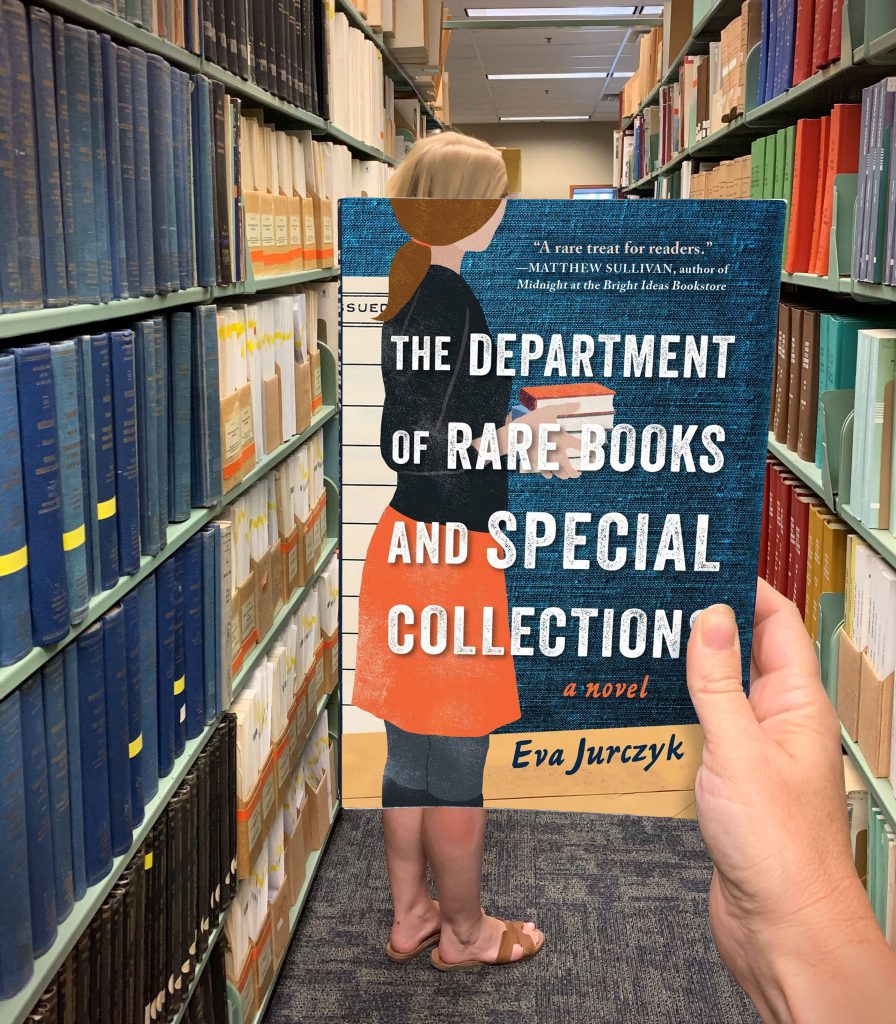
September is Library Card Sign Up month! And you can find your next great read on Nebraska Overdrive Libraries! Find all the library themed books in our “Library Card Sign Up Month” collection. One of the titles is “The Department of Rare Books and Special Collections: A Novel” by Eva Jurczyk (Poisoned Pen Press, 2023.) This novel about the secrets kept by quiet librarians is available as an eBook. There are 200 titles in the collection all about those bookish reads, and even better you can check them out with your library card!
“This intricately woven literary mystery brings readers into the cut-throat world of academia where rare book collections compete for money and prestige, and where those in power will do whatever it takes to protect their institution. A strong female protagonist and complex relationships drive this impressive, genre-bending debut.”
―Wendy Walker, international bestselling author of Don’t Look for Me
Find this title and many more through Nebraska OverDrive! Libraries participating in the Nebraska OverDrive Libraries Group currently have access to a shared and growing collection of digital downloadable audiobooks and eBooks. 189 libraries across the state share the Nebraska OverDrive collection of 21,696 audiobooks, 35,200 eBooks, and 3,964 magazines. As an added bonus it includes 130 podcasts that are always available with simultaneous use (SU), as well as SU ebooks and audiobook titles that publishers have made available for a limited time. If you’re a part of it, let your users know about this great title, and if you’re not a member yet, find more information about participating in Nebraska Overdrive Libraries!
Love this #BookFace & reading? Check out our past #BookFaceFriday photos on the Nebraska Library Commission’s Facebook page!
Friday Reads: The Reluctant Pilgrim by Roger Welsch
Roger Welsch’s The Reluctant Pilgrim is a curious and relatable book, a book of inter-connected stories from Welsch’s forty-year exploration of Native American community and spirituality. Known for his humor, this is not a book of humor. It is a thoughtful reflection on personal experiences and associations as an adopted member of the Omaha Tribe. Welsch’s journey expounds on the unexplainable, mysterious, the physical – round stones, eagle feathers, buffalo skulls, coyotes, and crows. In short, a phrase he repeats often “Something Is Going On.” Throughout, Welsch shares the inspiration and wisdom he experiences in his many associations with Native American communities, Native elders, ceremonies, and nature.
I confess to reading only this book among the forty plus Welsch wrote over many years. I do have several on the bookshelf and I look forward to reading them. Like many others, I’ve enjoyed Welsch’s public presentations. Storytelling was his special gift whether as a speaker or as a writer. His humor is notable but his generosity, perspective, wisdom, and devotion to the stories of the Great Plains stands out as truly remarkable.
Welsch left a tenured professorship at the University of Nebraska-Lincoln to move with his family to a small 60-acre property near Dannebrog, Nebraska. From there he intended to pursue a writing and speaking career – and that he did. Like many, I remember Roger Welsch’s twelve plus years as a correspondent presenting his biweekly “Postcards From Nebraska” on CBS News Sunday Morning.
It’s interesting that Roger Welsch, the recognized dean of storytellers, has a nearly uncountable number of stories about his own life that have become a part of our folklore. His interests were eclectic. He developed an interest in tractors and wrote about them. I gave away Busted Tractors and Rusty Knuckles to a farmer family member. Welsch founded the Liars Hall of Fame and he served on his county’s weed-control board to be a voice for preserving native grasses and other plants.
Others who have written about Welsch’s books recommend that The Reluctant Pilgrim be read with his earlier book, Touching the Fire.
Roger Welsch. The Reluctant Pilgrim: A Skeptic’s Journey into Native Mysteries. Lincoln: University of Nebraska Press. 2015.
#BookFaceFriday “Dead Water” by Ann Cleeves
This #BookFaceFriday is on the rocks!
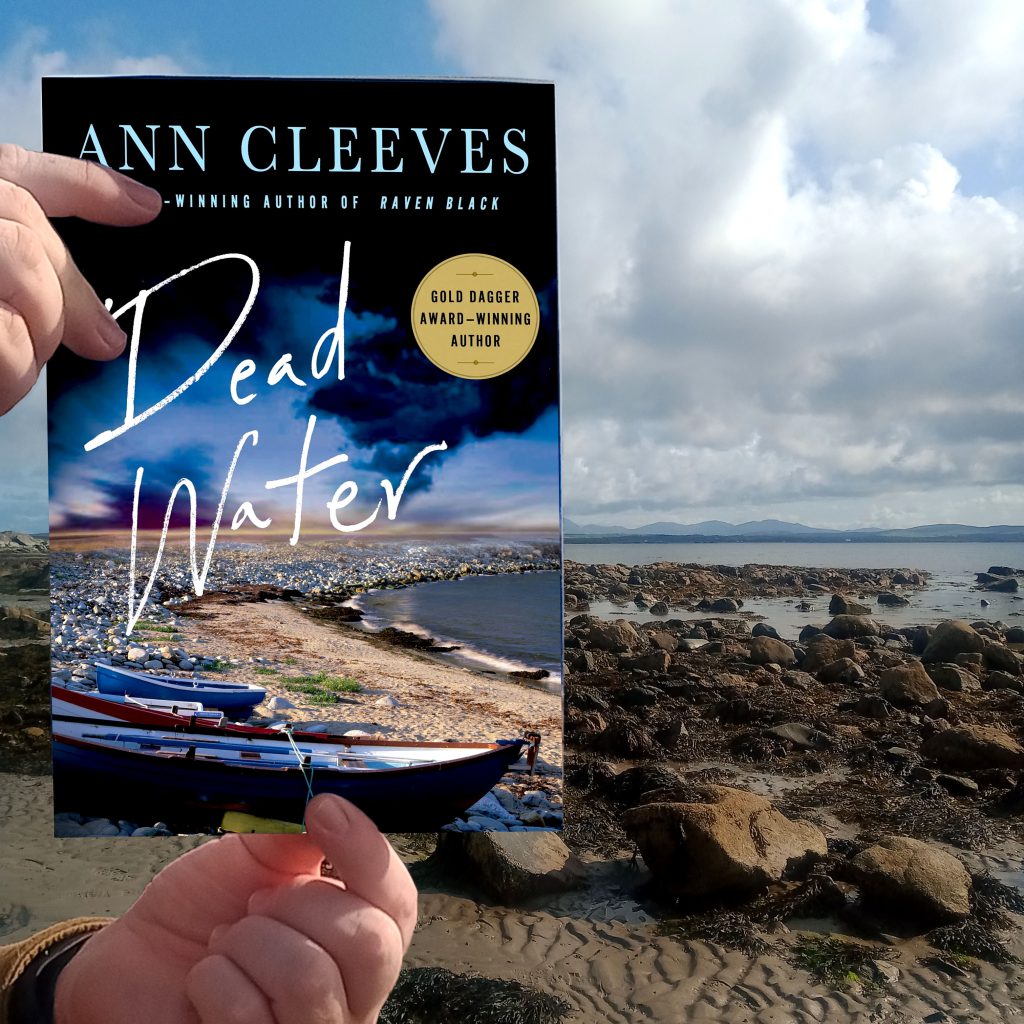
Ah dinnae ken why you’re not reading this #BookFaceFriday! “Dead Water: A Shetland Mystery” by Ann Cleeves (Minotaur Books, 2014) is part of an excellent detective series set in the Shetland Islands of Scotland. Dead Water is book five in her Shetland Island Mystery series and has been turned into a popular BBC series. We have several of Cleeves’ titles on Nebraska OverDrive Libraries, including all 8 books in the Shetland Island Mystery series!
“Cleeves has an unusually deft hand with characters; not one of them seems purely plot functional, and Perez’s character keeps deepening with each book. The rough islands cresting the Atlantic fit the bleakness of the murders depicted here. This series is one of two that Cleeves has going; the other stars Northumberland detective Vera Stanhope and is a hit BBC series.”
– Booklist (starred review)
This week’s bookface was shot “on location” by Nebraska Library Commission’s Lisa Kelly on her vacation in Scotland!
Find this title and many more through Nebraska OverDrive! Libraries participating in the Nebraska OverDrive Libraries Group currently have access to a shared and growing collection of digital downloadable audiobooks and eBooks. 188 libraries across the state share the Nebraska OverDrive collection of 21,696 audiobooks, 35,200 eBooks, and 3,964 magazines. As an added bonus it includes 130 podcasts that are always available with simultaneous use (SU), as well as SU ebooks and audiobook titles that publishers have made available for a limited time. If you’re a part of it, let your users know about this great title, and if you’re not a member yet, find more information about participating in Nebraska Overdrive Libraries!
Love this #BookFace & reading? Check out our past #BookFaceFriday photos on the Nebraska Library Commission’s Facebook page!
Friday Reads: Educated by Tara Westover
As a relatively new Nebraska Library Commission employee, I have thoroughly enjoyed learning about the various collections at the Commission, including the impressive book club kits. I’m always curious to see what is being shipped out to libraries across the state on any given week. Knowing my interest in non-fiction, my colleague pointed one of the memoirs in the book club kits: Educated, by Tara Westover. It was not yet on my Libby wish list, so I had to add it, and I later listened to it as an audiobook.
Tara Westover was raised by a fundamentalist Mormon family in rural Idaho. Her parents coached their children to say they were “homeschooled” if anyone inquired, but in reality Tara spent most of her childhood working alongside her father and brothers in the family scrapyard. Her parents were suspicious of many things in the world outside their secluded family. They rejected formal education and modern medicine, preferring to rely on faith and homeopathy. Her father was obsessed with preparing for the end of times, and compulsively stockpiled food and supplies. He distrusted everything about the government and chastised most outsiders as socialists who were influenced by the Illuminati.
Tara’s childhood was filled with fear and sadness. She experienced horrific violence, shaming, and threats from an older brother. The family culture taught that women should be submissive and modest, and she was frequently shamed or witnessed the shaming of other women. But Tara was also inspired to learn and to leave. She decided to follow in the footsteps of an older brother who was self-motivated to study, take the ACT, and go to college.
Tara’s challenges did not disappear after enrolling at BYU at the age of seventeen. Much of the book deals with her collegiate life and self-discovery. Tara’s journey had many ups and downs as she navigated a world she was unfamiliar with, and she dealt with a lot of push and pull from her family, who disputed her claims of abuse. They have continued to disagree with her perspectives, and her mother later published a book of her own.
Educated covers a lot of heavy topics including abuse, mental illness, and many layers of family trauma. But it is also a story about self-discovery, belonging, and finding a voice, which many readers will likely connect with. Educators and those who work with youth may find inspiration in the power of mentoring those without family support to find opportunities and strive to do the big things they never imagined they could do. Larger themes of facing fears and finding strength also run through the book. One of my favorite things Tara discovers is “books were not tricks and I was not feeble.”
Westover, Tara. Educated. Random House, 2018.
Book Club Spotlight – Crying in H Mart
Today, we are looking at another memoir of a woman who is grieving the loss of her mother. But unlike our last Spotlight, I’m Glad My Mom Died by Jennette McCurdy, Michelle Zauner’s relationship with her mother was tender and precocious despite their differences. Her memoir, Crying in H Mart, having spent 55 weeks on the New York Times’s bestseller list, is Zauner’s story of returning to her hometown of Eugene, Oregon, to be by her mother’s side as she succumbs to cancer. Her loss inspired Zauner’s debut studio album, Psychopomp. The album was highly praised, and since then, Zauner has reached commercial success, being named one of Time Magazine’s most influential innovators in 2022.
Michelle was always told that 25 would be an important year for her. After all, it is when her mother, Chongmi, met and married Michelle’s father, an American living in Korea for work. For Michelle, 25 was the year cancer slowly took her mother’s life. As a first-generation Korean-American, Michelle did not have the easiest time growing up. Between facing racism from her peers and pressure from her mother to be the perfect daughter, Michelle poured her heart into creative passions like music and writing. When Chongmi was diagnosed with cancer, Michelle was in a creative and financial rut. Her band at the time wasn’t reaching much success, and her day jobs consisted of whatever part-time gigs she could manage. So when the diagnosis came, she dropped everything to attend to her ailing mother, hoping to repair the bond between them and repay her for the unending love and care she didn’t cherish when she was younger. Throughout the memoir, Zauner attempts to nourish her and her mother’s relationship while nourishing their bodies through learning to cook Korean food.
“The lessons she imparted, the proof of her life lived on in me and in every move and deed. I was what she left behind. If I could not be with my mother, I would be her.”
Michelle Zauner
Crying in H Mart explores the bonds between food, culture, and family. While a strict parent, Zauner’s mother expressed her love in subtle ways, such as preparing traditional meals. Having found comfort and safety in these meals, Zauner learns to cook them for her mother as a quiet way to repay her for the life she was given. Growing up in Eugene, Oregon, her mother was Zauner’s only connection to her Korean side, so she finds herself inexplicably lost when she realizes there is no one left to help keep this half of herself alive. She contemplates how children of immigrants often feel a need to become Americanized to fit in, which leads to polarization or loss of the cultural heritage that their parents represent.
It’s not often that a book comes with a built-in soundtrack, and I highly recommend listening to Psychopomp for a whole reading experience. The album, named after entities that are said to shepherd souls to the afterlife, revolves around Zauner’s mother and her final days, featuring Chongmi on the album cover and her voice in the title song comforting Michelle. This multimedia experience is an excellent way for Book Club Groups to delve into the different ways we grieve, our interpersonal relationships, and how creativity and beauty can blossom from pain.
If you’re interested in requesting Crying in H Mart for your book club, you can find the Request Form here. There are 5 copies available. (A librarian must request items)
Zauner, Michelle. Crying in H Mart. Vintage Books. 2021.
#BookFaceFriday “The Chaperone” by Laura Moriarty
Better keep an eye on this #BookFaceFriday!
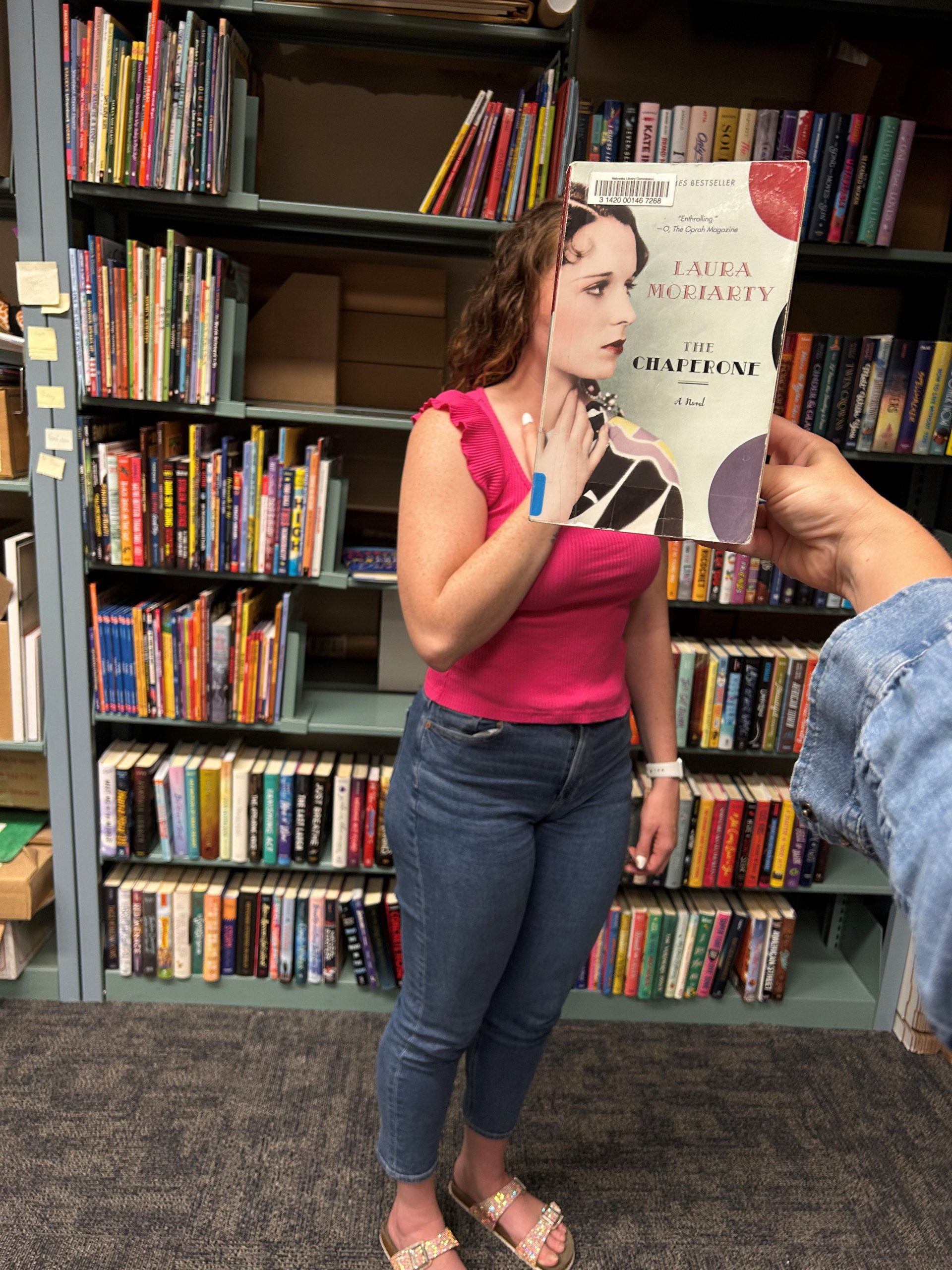
This #BookFaceFriday shouldn’t be left unattended! The story of young silent movie star, Louise Brooks, and the woman who escorts her to New York City, The Chaperone by Laura Moriarty, (Riverhead, 2013) is available as a Book Club Kit.
This title is also available as an ebook in Nebraska Overdrive Libraries. Looking for more historical fiction for your reading group? Use the “Genre” drop-down menu to browse all titles available in our collection.“The Chaperone is the enthralling story of two women . . . and how their unlikely relationship changed their lives. . . . In this layered and inventive story, Moriarty raises profound questions about family, sexuality, history, and whether it is luck or will—or a sturdy combination of the two—that makes for a wonderful life.”
—O, The Oprah Magazine
Book Club Kits Rules for Use
- These kits can be checked out by the librarians of Nebraska libraries and media centers.
- Circulation times are flexible and will be based upon availability. There is no standard check-out time for book club kits.
- Please search the collection to select items you wish to borrow and use the REQUEST THIS KIT icon to borrow items.
- Contact the Information Desk at the Library Commission if you have any questions: by phone: 800/307-2665, or by email: Information Services Team
Love this #BookFace & reading? Check out our past #BookFaceFriday photos on the Nebraska Library Commission’s Facebook page!
Posted in Books & Reading, General
Tagged Book Club Kits, bookface, bookfacefriday, Chaperone, Fiction, Laura Moriarty, Reading
1 Comment
Friday Reads: Chaos: Charles Manson, the CIA, and the Secret History of the Sixties
The subject matter in Chaos explores many of the general goings on in the 60’s and 70’s, and a few specific ones. Tom O’Neill begins this journey by examining (with a fresh lens independent of Vincent Bugliosi’s Helter Skelter), the Mason murders and leads to the CIA, government cover-ups, frauds, and numerous examples of “this doesn’t look right”. It would be easy to dismiss all of what O’Neill writes about as conspiracy. I’m certain that some will, without even reading his reporting, but doing so would be a closed minded disservice to understanding important facets of what he explores. Speaking of conspiracy, we live in times where discourse, discussion, and debate are largely dead. Instead, we have labels and zero substance – quick one-liners (often labels) that grab attention and fit our societal mentality of the short or non-existent attention span of citizens. This is consistent with the omnipresent cell phone mentality – use of the phone between sets at the gym, use of the phone during in-person meetings whilst someone else is speaking, and even the use of the phone between writing sentences. It should be noted that the book’s title – Chaos, is a reference to the CIA’s domestic espionage program from 1967 to 1974, encompassing numerous government activities.
Chaos starts with this fresh look at the Manson murders, challenging Bugliosi’s Helter Skelter theories. While O’Neill doesn’t purport to have all the answers or a smoking gun, he illustrates, often from public records and interviews, many inconsistencies in the official narratives. Whether related or unrelated, O’Neill uncovers facets of the CIA’s involvement in a number of things that oddly intersect the Manson players, notably its CHAOS and MK-ULTRA programs. Undoubtedly, the CIA was running in the same circles as the Manson family (as was Hollywood), and O’Neill aptly sums up his conclusion that things did not smell right:
“So when I plunged into their stories with Manson and found evidence of serial dishonesty—again, often connected to federal law enforcement and intelligence agencies—I had to ask myself if I was crazy to be doing all of this.”
This book is relatively long, at 528 pages. O’Neill’s contract was cancelled by the original publisher and sustained threats of lawsuits and smears from Bugliosi, but eventually published after O’Neill’s long period of research. An apt summation can be found in O’Neill’s Epilogue:
“My goal isn’t to say what did happen—it’s to prove that the official story didn’t.”
I imagine that since so much time has elapsed between the events described by O’Neill in Chaos and the current day, much of what he writes will be largely ignored. Likely, had this book been written closer to the Manson murders, O’Neill would probably be smeared under the umbrella of something like the Martha Mitchell effect. Doing so would largely be a mistake that seeks to erase important facets of American history, albeit unflattering to law enforcement and the CIA.
O’Neill, Tom and Piepenbring, Dan. CHAOS: Charles Manson, the CIA, and the Secret History of the Sixties. New York, Little, Brown and Company. 2019.
